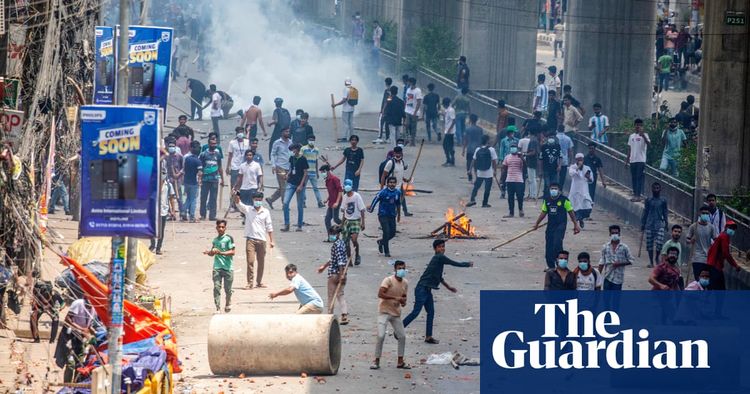Bangladesh imposes communications blackout as protest violence continues

A ban on communication has been put in place in Bangladesh, where mobile internet has been blocked and news channels have been turned off. This comes as the country is experiencing ongoing protests which have resulted in the deaths of 39 individuals this week.
On Thursday evening, the authorities announced the suspension of mobile internet services due to security concerns in response to widespread demonstrations organized by a large number of students. Additionally, access to social networking sites was restricted.
On Friday morning, TV news channels were still not broadcasting due to protesters storming and setting fire to the state broadcasting headquarters in Dhaka.
The demonstrations started on college campuses this month as students called for the elimination of a rule that sets aside 30% of public sector positions for relatives of veterans who participated in Bangladesh's war for independence in 1971.
The protesters claim that the policy is unjust and biased, and mainly favors individuals affiliated with the ruling Awami League party, headed by Prime Minister Sheikh Hasina.
The protests have turned into some of the most severe unrest in ten years as student groups supporting the government were accused of assaulting the protesters, and law enforcement used teargas and rubber bullets on the crowds.
Fights between police with weapons and protesters with sticks and rocks happened in many places in the country. Cars were burned in the streets, and thousands of people were hurt.
The Dhaka Times reported that one of its journalists, Mehedi Hasan, was tragically killed while reporting on the clashes happening in the city.
Last Thursday, a group of protesters forcefully entered the main office of the state broadcaster, Bangladesh Television, and deliberately started a fire. Officials stated that everyone inside the building was safely removed.
Access to social media was limited because the telecommunications minister, Zunaid Ahmed Palak, stated that it had been used as a weapon to spread false information and rumors.
Hasina, aged 76, decided to close down all universities and colleges until further notice. In a speech given on Wednesday evening, she criticized the "killing" of students during the protests and assured that justice would be served. She advised the students to wait for a high court ruling on the quota system, but this did not calm down the ongoing unrest.
Friday morning was chaotic in Dhaka as the loud noises of gunfire and stun grenades filled the air near university campuses.
People who were present at the protests mentioned that they had evolved to include a wider opposition to the government led by Hasina and her political party. Protesters were heard chanting slogans referring to her as an "authoritarian dictator".
Hasina has been in power since 2009 and has implemented a harsh crackdown on those who oppose her politically. Many important figures are regularly taken away by paramilitary forces in what are called "enforced disappearances," and many political opponents have been imprisoned. She was re-elected in January in an election that was widely criticized for being heavily manipulated.
The protesters became even more enraged when the prime minister seemed to insult them by calling them "razakars", a term that refers to people who betrayed the country by working with Pakistan during the war for independence.
The limits that caused the demonstrations were removed in 2018 but reinstated recently following a legal decision, causing anger among students. Unemployment rates among young people are elevated in Bangladesh, and jobs with the government are perceived as one of the few ways to guarantee stable employment. The youth argue that the restrictions make it extremely challenging to secure these jobs based on merit.
The political party led by Hasina, started by her father who fought for Bangladesh's independence, is being charged with receiving too many advantages from the system.
Pierre Prakash, who leads the Asia division of the International Crisis Group, stated that the demonstrations were a sign of increasing discontent among the public about the lack of democracy and representation of their concerns.
The demonstrations show that there are serious issues with politics and money in Bangladesh. The economy has been having a hard time for a while, and many young people can't find jobs. Because they don't see any other way to express themselves, unhappy Bangladeshis are turning to protests in the streets.
Stéphane Dujarric, who speaks for the UN secretary general, stated that they are keeping an eye on the situation in Bangladesh and called for all parties to show self-control.

































































